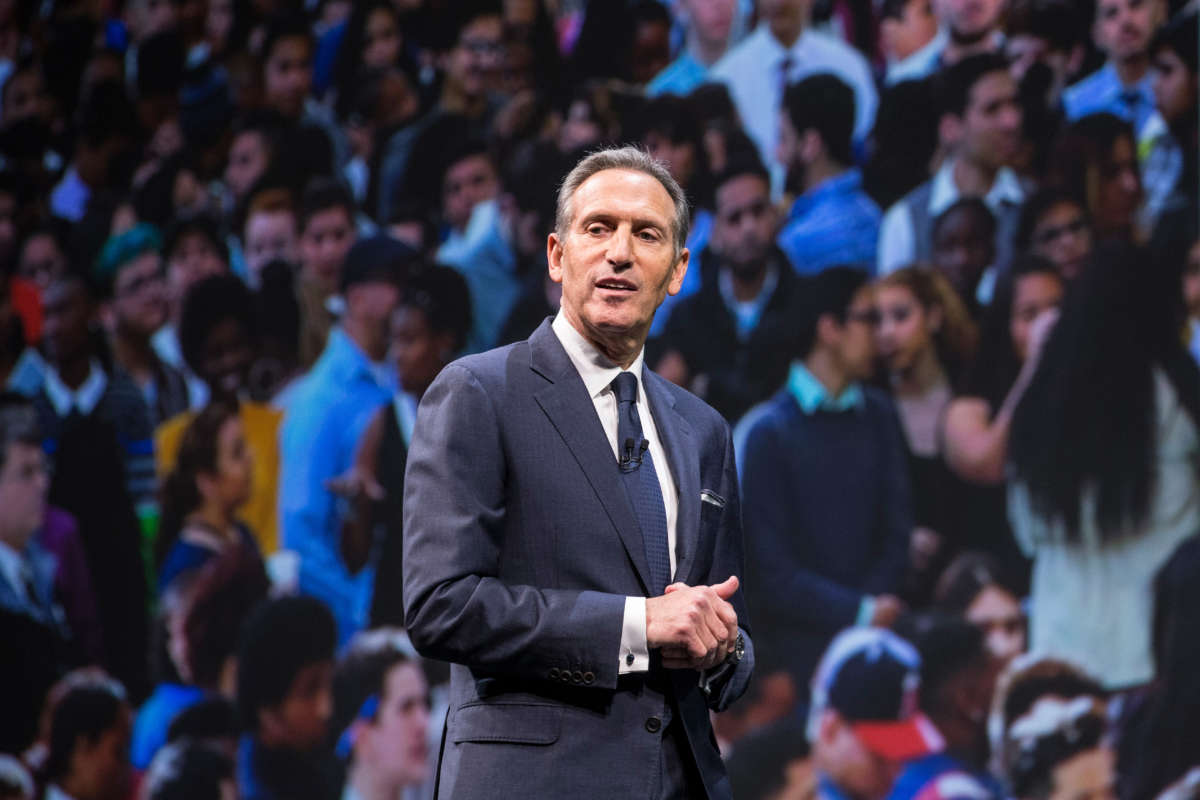Did you know that Truthout is a nonprofit and independently funded by readers like you? If you value what we do, please support our work with a donation.
Starbucks CEO Howard Schultz’s suggestion to a pro-union worker earlier this year that they should “work somewhere else” constituted an illegal threat, labor officials are alleging.
During a meeting between Schultz and Long Beach, California, workers in April, Schultz told pro-union worker Madison Hall, “I’m sensing a lot of anger from you about Starbucks.” Hall had been a leader of the union effort at a Long Beach store.
“If you hate Starbucks so much, why don’t you work somewhere else?” Schultz continued. Hall later resigned. It had been Schultz’s first week returning as CEO of Starbucks — a move the company made specifically so he could lead their union-busting campaign, the union said at the time.
Labor officials have filed a complaint over Schultz’s remarks, saying that the CEO “threatened employees with discharge by inviting employees to quit their employment because they engaged in union and/or protected concerted activities,” per Bloomberg.
According to the union, prior to the remark, Schultz had asked workers how he could help restore trust in the company, to which Hall said that the company could lighten up on and be more transparent about its anti-union campaign.
“The worker was immediately silenced and told not to bring the union movement,” the union said in a press release. “Schultz ‘apologized’ on behalf of the employee to the rest of the group.”
“We are fighting to make Starbucks a better company and better place to work. We want to bargain with the company as equals and have a real voice,” Josie Serrano, a Long Beach barista, said in a statement. “Howard Schultz is not good for Starbucks. Threatening a barista for simply wanting to make Starbucks better is not only absurdly inappropriate, but downright childish and mean.”
The company has denied wrongdoing, saying that Schultz made the comments to keep the meeting on topic.
Starbucks Workers United attorney Gabe Frumkin told Bloomberg that the interaction showed not just Hall but all of the employees present that the company could retaliate against them if they organize a union. Schultz’s comment “shows that they can either change the terms of your work relationship, or end it entirely based on the fact that a worker has voiced support for a union,” Frumkin said.
This is the second labor charge that the National Labor Relations Board (NLRB) has filed in response to Schultz’s actions. In August, the NLRB charged the company with breaking labor laws when Schultz promised wage raises for nonunionized employees only.
Overall, according to the union, the NLRB has issued 37 complaints alleging over 800 labor law violations by Starbucks.
Workers have successfully unionized over 250 stores so far. Their campaign appears to be entering a new phase as they begin to sit down with the company to negotiate first contracts. But the company has been extremely resistant to making progress at such negotiations and has walked away from bargaining meetings across multiple stores after just minutes in the room, workers say.
Trump is silencing political dissent. We appeal for your support.
Progressive nonprofits are the latest target caught in Trump’s crosshairs. With the aim of eliminating political opposition, Trump and his sycophants are working to curb government funding, constrain private foundations, and even cut tax-exempt status from organizations he dislikes.
We’re concerned, because Truthout is not immune to such bad-faith attacks.
We can only resist Trump’s attacks by cultivating a strong base of support. The right-wing mediasphere is funded comfortably by billionaire owners and venture capitalist philanthropists. At Truthout, we have you.
Our fundraising campaign is over, but we fell a bit short and still need your help. Please take a meaningful action in the fight against authoritarianism: make a one-time or monthly donation to Truthout. If you have the means, please dig deep.
